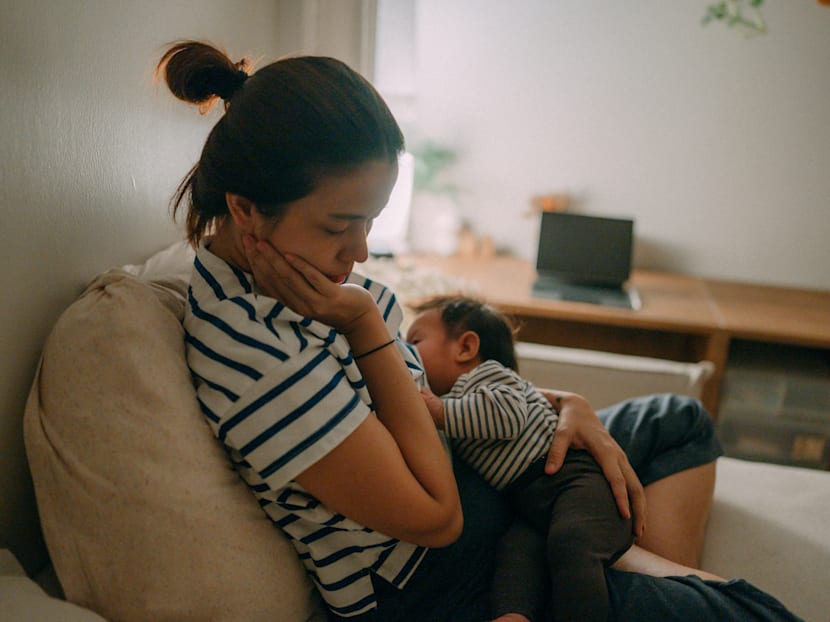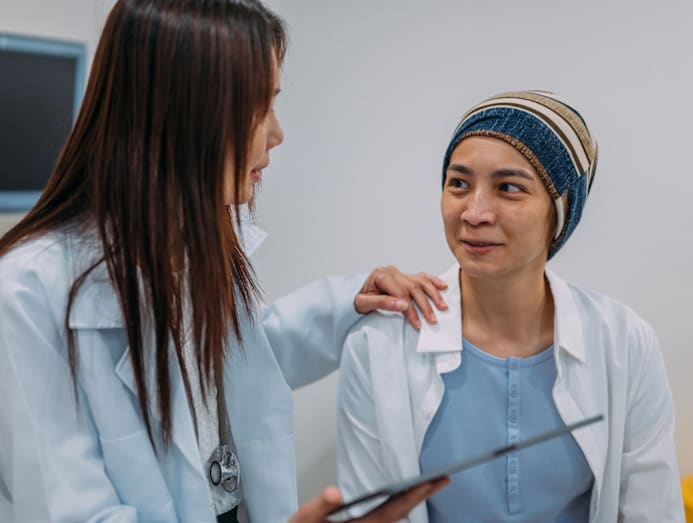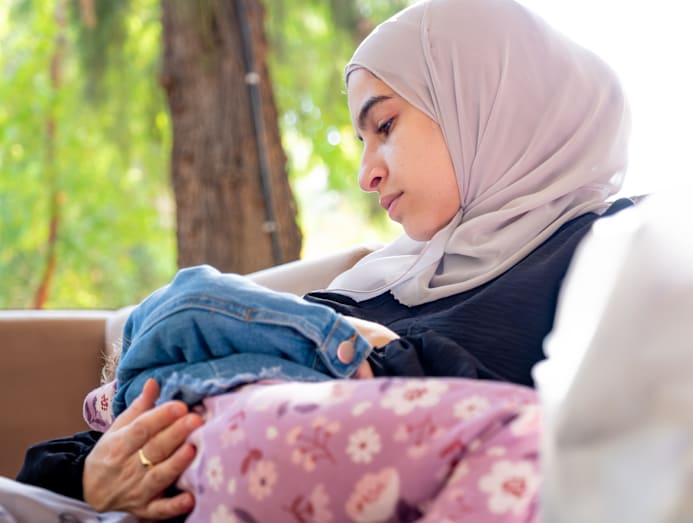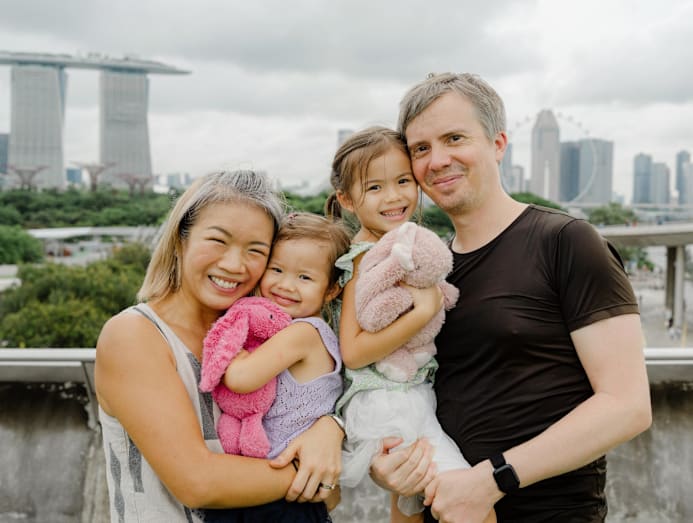Breastfeeding after breast cancer: Is it still possible to nurse your baby safely?
Doctors and a breast cancer survivor say it’s possible, depending on the treatment plan, including the type of mastectomy you had, the duration of chemotherapy, and the side effects of the treatment.

Some breast cancer survivors can still breastfeed, if they wish. (Photo: iStock/staticnak1983)

This audio is generated by an AI tool.
When Daphne Pang breastfed her newborn daughter for the first time in 2019, she felt a mix of disbelief and wonder.
Then 38, she never thought she would experience breastfeeding. That’s because Pang, who works in marketing, was diagnosed with Stage 2B breast cancer when she was 31. Her treatment plan included a single mastectomy, where one breast was removed, allowing her to nurse from the other.
Pang is among the 45 per cent of women who manage to breastfeed after a single mastectomy, said Dr Peter Ang, senior medical oncologist at OncoCare Cancer Centre.
Breastfeeding after breast cancer is rarely straightforward, Dr Ang added. Women in this situation fall into two groups: Those diagnosed with breast cancer during their nursing journey, and those who survive breast cancer and later get pregnant.
Each group faces distinct physical and emotional challenges, but these mothers share the same question: “Can I even breastfeed after breast cancer?”
FACING BREAST CANCER WHILE BREASTFEEDING
There are different types of breast cancer treatments, Dr Ang said.
Your doctor may recommend a lumpectomy (removing part of the breast) or mastectomy (removing the entire breast).
You can also undergo radiation therapy (also called radiotherapy), where high-energy rays are used to kill cancer cells and shrink tumours.
There are also systemic therapies using drugs: Chemotherapy destroys or shrinks cancer cells, hormone therapy blocks the hormones that help cancer cells grow, and immunotherapy stimulates the body’s immune system to recognise and attack cancer cells.
“For women who have not started cancer treatment, it is usually safe to continue breastfeeding,” said Dr Lee Wai Peng, senior consultant and breast surgeon at Solis Breast Care & Surgery Centre.
“It’s a myth that breast cancer can pass through breast milk,” she added.
Dr Mythili Pandi, a lactation consultant, family physician and the director of Mother & Child pregnancy care centre, said that mothers who undergo a lumpectomy can continue breastfeeding if the affected breast can still produce milk, while those who have had a single mastectomy can usually nurse from their unaffected breast.
One of Dr Mythili’s patients was a mother with a six-month-old baby who found a lump in her breast that persisted despite fully expressing her milk. The patient was referred to a breast centre, where she underwent an ultrasound biopsy and was advised to have a lumpectomy.
“It was a very distressing episode for the new mum, but she was still able to breastfeed from both breasts after everything she went through, and stopped only when it became emotionally stressful for her,” said Dr Mythili.

Dr See Hui Ti, a medical oncologist at Parkway Cancer Centre, says a woman who has had a single mastectomy may also experience common breastfeeding issues such as engorgement (painful swelling when breasts become overly full), clogged ducts (when milk flow is blocked), and mastitis (inflammation or infection of breast tissue) – in that one breast.
“These conditions can be distressing for breast cancer survivors, as they can mimic cancer symptoms – such as a lump, redness, or rashes from mastitis – when there are actually none,” said Dr See, who highlighted that any new lump or skin change should be evaluated by a doctor.
When it comes to non-surgical treatments, whether for one breast or both, the doctors CNA Women spoke with strongly recommend that the mother not breastfeed, as most medications can pass into the breast milk and harm the baby.
“Women who are breastfeeding shouldn’t breastfeed while on some treatment plans, like chemotherapy or hormone therapy,” Dr Ang said.
Oncologist Dr See added that hormone therapy can also make breast milk unsafe for babies, as drugs such as tamoxifen or aromatase inhibitors are transferred into breast milk and can harm infants.
She added that some treatments, like radiation therapy, can make breastfeeding a tiring process.
“While radiation usually takes place on one breast and the treatment does not get transferred into the milk, the radiated breast itself may not produce enough or any milk – this can cause the nursing mother to feel exhausted or demoralised,” Dr See explained.
For mums who need to start treatment urgently, Nabila Hanim, a lactation consultant and president of the Breastfeeding Mothers’ Support Group (BMSG), suggested expressing and storing breast milk before starting therapy – and doing so under their doctor’s guidance – so that the baby can be fed with safe, expressed milk during treatment.
It’s a myth that breast cancer can pass through breast milk.
“While every mother’s situation is complex, women should be informed of all available options,” said Nabila. “If they are determined to breastfeed and it is safe for them, they should be encouraged to do so.”
She added that BMSG has supported several women diagnosed with breast cancer while nursing, offering guidance to help them navigate their breastfeeding journeys.
Dr Lee from Solis Breast Care & Surgery Centre emphasised that mothers should never feel pressured or guilty if they cannot breastfeed, whether due to physical or emotional factors.
“There are alternatives to exclusive breastfeeding,” Dr Lee said. “What’s also important is the emotional bond between mum and baby, and you can do many things for that which don’t include breastfeeding.”
She added that mums can also tap on other resources to feed their child, including retrieving milk from milk banks, such as the one at KK Women’s and Children’s Hospital, or turning to appropriate formula milk.
BREASTFEEDING AFTER SURVIVING BREAST CANCER
These women get pregnant and give birth after their initial breast cancer diagnosis. Pang, who was Dr Ang’s patient, is one of them.
Although it may have been some time since they completed treatment and entered remission, they may wonder if breastfeeding is possible or safe for them and their baby.
For women who have undergone a double mastectomy, where both breasts are removed, breastfeeding is not possible, said Dr Lee.
For those who have received systemic therapies such as chemotherapy, Dr Lee explained that the drugs’ effects are not permanent.
Once the treatment cycles are finished, the medication is typically cleared from the body within several weeks to a few months, depending on how intensive the treatment was, oncologist Dr Ang said. It is safe to breastfeed after that.

Breast surgeon Dr Lee added that women who have had a lumpectomy or single mastectomy may face challenges such as low milk supply, since surgery can disrupt the milk ducts that allow milk to flow to the nipple.
Other issues for mothers nursing with one breast include nipple soreness, as only one side is used, and physical imbalance, because only one breast becomes full with milk, she said.
Dr Mythili added that these are difficulties that mothers without a history of breast cancer also face. “Some women can only produce milk and feed from one breast,” she said. “Every woman’s breastfeeding journey is unique.”
Some women also worry about whether breastfeeding could cause cancer recurrence in either breast. Dr Mythili said the chances are very low, adding that breastfeeding has even been associated with a reduced risk of recurrence.
“The risk of recurrence is related to the initial stage and other tumour factors at diagnosis,” added Dr Ang. “The risk is not significantly worsened by breastfeeding, according to the latest information we have.”
NURSING CAN RESTORE HOPE AND AGENCY
Pang told CNA Women that while breastfeeding after breast cancer came with challenges, it was also a fulfilling and meaningful experience for her as a mother.
The Hong Kong-born Singapore permanent resident was first diagnosed in 2012 when she was 31. Given her family history of cancer, she was aware of her risk, but the diagnosis was still a shock. Her mother had breast cancer twice in her 30s, and three aunts had ovarian cancer.
“Thankfully, I found out early, and after discussing options with my oncologist and my boyfriend, now my husband, whom I knew I wanted to start a family with, I decided to pause everything and focus on getting better,” Pang said.
Pang completed her cancer treatment in 2018. By then, she had undergone a single mastectomy and was declared in remission, although she was still completing the last phase of her treatment.
Not long after that, Pang discovered she was pregnant. While it’s generally not recommended to conceive during hormonal therapy, Dr Ang supported her through close monitoring, and she later gave birth to a healthy baby girl in 2019.

Convinced of the benefits of breast milk, Pang was determined to breastfeed. She was inspired by her own mother, who nursed her and her sisters as a breast cancer survivor.
“It was really hard to nurse from only one breast, but I’m so happy and grateful I got to do it,” the 44-year-old said. Pang managed to exclusively breastfeed her daughter from her unaffected breast for around six months, and did so again with her second daughter, who was born in 2021.
“When I saw the milk come out of me and watched my baby feed, I just felt so proud of myself,” she said. “I’m amazed by how my body adapted to all its different conditions.”
Dr Ang said: “Breastfeeding mums in general need a lot of support. And for breast cancer survivors who are nursing or are hopeful nursing mums, the support is even more crucial.”
He highlighted that support can include having a quiet, calm and comfortable environment at home or work; maintaining good nutrition and hydration; and receiving help from the husband and other family members in any area so that the mother can focus on feeding and bonding with their baby.
“Breastfeeding can hold deep emotional meaning for survivors,” said lactation consultant Dr Mythili.
“It often helps mothers feel adequate. It makes them feel they’re still able to support their child, even if it’s just a little bit, especially after everything they and their bodies went through.
“I often refer to breastfeeding as an extension of having the baby in the womb – a continuation of that connection, and a natural way for women’s bodies to show their own resilience,” she added. “It can be especially healing for breast cancer survivors to go through that with their baby.”
CNA Women is a section on CNA Lifestyle that seeks to inform, empower and inspire the modern woman. If you have women-related news, issues and ideas to share with us, email CNAWomen [at] mediacorp.com.sg (CNAWomen[at]mediacorp[dot]com[dot]sg).






